| Srl | Item |
| 1 |
ID:
157357


|
|
|
|
|
| Summary/Abstract |
The Second Hague Conference of 1907 is widely regarded as a turning point in the evolution of international society. Constructivist and English School accounts, in particular, highlight the active role played by Latin American delegates in advocating the principles of sovereign equality and nonintervention. I argue that this common interpretation erroneously relies on a retrospective reading of the “norm entrepreneurship” of Latin American states. Rather than aiming to transform the hierarchical international order of the time, foreign policy elites from Latin America sought to use the conference as a platform for increasing their countries’ status. Because of their comparative lack of resources, smaller powers will often try to pursue status through diplomacy and the use of international law, and their status gains in multilateral settings depend on the acquiescence of higher-ranked states. This explains both the diplomatic posturing of Latin American delegates at The Hague and their failure to make substantive status gains.
|
|
|
|
|
|
|
|
|
|
|
|
|
|
|
|
| 2 |
ID:
084175


|
|
|
| 3 |
ID:
093009
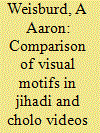

|
|
|
|
|
| Publication |
2009.
|
| Summary/Abstract |
Homegrown Sunni extremists (jihadis) and Latin American street gang members (cholos) represent potential threats to national security. Both groups are known to inhabit the video- sharing website YouTube. Videos representative of each group were selected at random, and the visual motifs in the videos were categorized. Findings suggest similarities and differences between the two groups that may have significance for how practitioners address each threat, and for determining the likelihood that the two groups may begin to work in concert. The portraits that emerge of jihadis and cholos may assist in developing strategies to counter the violence perpetrated by each.
|
|
|
|
|
|
|
|
|
|
|
|
|
|
|
|
| 4 |
ID:
085036
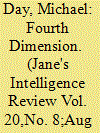

|
|
|
| 5 |
ID:
083579
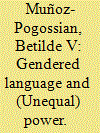

|
|
|
|
|
| Publication |
2008.
|
| Summary/Abstract |
After visiting Latin America in 1950, George F. Kennan presented a report to the Secretary of State Dean Acheson on his impressions of the region and its significance for the United States in the early Cold War period. This framed much of US-Latin American relations in the early Cold War. This article attempts to determine whether a relationship can be established between notions of power attached to feminine and masculine roles in society and the power dynamics determining US-Latin American relations in this period. US-Latin American relations are analyzed from a gender perspective based on the premise that knowledge and language are socially constructed and influence the practice of diplomacy. The initial hypothesis suggests that because language conveys symbolic representations of power, that is, notions of a superior-subordinate relationship, US officials found it useful to use gender analogies and metaphors when discussing US-Latin American relations. Kennan's reports on the region as well as other US officials' documents related to US policy towards Guatemala in this period are analyzed to uncover notions of unequal power.
|
|
|
|
|
|
|
|
|
|
|
|
|
|
|
|
| 6 |
ID:
117847
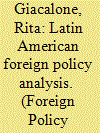

|
|
|
|
|
| Publication |
2012.
|
| Summary/Abstract |
This article reviews the evolution of foreign policy analysis (FPA) in Latin America in order to explore the role played by domestic contextual factors and external theoretical influences. Applying notions that Jorgensen (Journal of International Relations6 (1):9-42) has employed for the study of European FPA, it concludes that incorporating the cultural-institutional context in which Latin American academics write enhances our understanding of national variations and of how internal and external factors get connected.
|
|
|
|
|
|
|
|
|
|
|
|
|
|
|
|
| 7 |
ID:
161420


|
|
|
| 8 |
ID:
143849
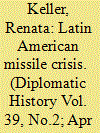

|
|
|
|
|
| Summary/Abstract |
This is a transnational history of the ways that the Cuban Missile Crisis affected national politics and international relations in the Americas. It argues that Latin American governments and citizens tried to take advantage of the crisis to change both local balances of power and relations with the United States.
|
|
|
|
|
|
|
|
|
|
|
|
|
|
|
|
| 9 |
ID:
157531
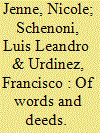

|
|
|
|
|
| Summary/Abstract |
The idea of an integrated Latin American region goes back to the early post-independence period, and yet, in substance, Latin American regionalism has remained far behind its stated aims. The perceived implementation gap has raised the question why policymakers continued to talk about something they appeared to avoid in practice. This article contributes to the debate on Latin America’s integration gap by exploring the phenomenon of declaratory regionalism - the practice of referring to the region and its institutions in political speeches. Based on quantitative text analysis of the speeches presidents delivered annually at the UN’s General Assembly between 1994 and 2014, we show that this practice has not been uniform. Presidents distinguish between different forms of regionalism, integration and cooperation, and frame the geographical region they refer to accordingly. In motivating presidents to speak about integration as opposed to cooperation, ideology and democratic performance stand out as crucial factors.
|
|
|
|
|
|
|
|
|
|
|
|
|
|
|
|
| 10 |
ID:
096182
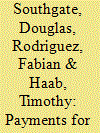

|
|
|
| 11 |
ID:
140919
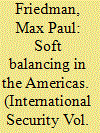

|
|
|
|
|
| Summary/Abstract |
In the aftermath of the 2003 U.S.-led invasion of Iraq, scholars of international relations debated how to best characterize the rising tide of global opposition. The concept of “soft balancing” emerged as an influential, though contested, explanation of a new phenomenon in a unipolar world: states seeking to constrain the ability of the United States to deploy military force by using multinational organizations, international law, and coalition building. Soft balancing can also be observed in regional unipolar systems. Multinational archival research reveals how Argentina, Mexico, and other Latin American countries responded to expanding U.S. power and military assertiveness in the early twentieth century through coordinated diplomatic maneuvering that provides a strong example of soft balancing. Examination of this earlier case makes an empirical contribution to the emerging soft-balancing literature and suggests that soft balancing need not lead to hard balancing or open conflict.
|
|
|
|
|
|
|
|
|
|
|
|
|
|
|
|